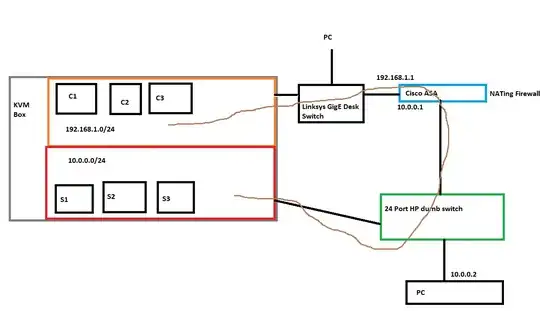I am trying to benchmark an ASA under various conditions but what is throwing me off is my baseline seems to be odd. I am trying to load an ASA to full capacity. See the attached topology diagram:
The players are:
- C1 a Linux client runs a continuous download of a 300 GB file and loops this from S1, a Linux server running HTTPD.
- C2 a Linux client also runs a continuous download of a 300 GB file and loops this from S2, a Linux server running HTTPD.
- C3 runs AB to try and generate more connections.
ab -n100 -c99999999 http://10.0.0.57/This is to S3, a Linux server running HTTPD. - Cisco ASA 5520 running 8.4.
What I found odd was that even with all this going on the max I saw was just over 500 Mbps (observed via NLOAD on both VM box physical interfaces). Is this normal? Everything is Gig. Some questions:
- Is it likely that my crappy Linux desk switch is bottlenecking?
- Does NATing really kill performance that bad or is something else going on? The CPU on the Dispatch Process was 30% under load.
- Is this is likely a disk issue as the servers are simply reading the file as fast as they can?
- What I found odd was that C1 would not transfer at it's full speed until I had it download 3 copies of the file from S1 at once (about 250 Mbps at this point). Why are 3 parallel downloads from S1 faster than a single download? Shouldn't S1 send as quick as it possibly can?
Is there a better way to load test network equipment. Downloading a single large file does not seem realistic. I am trying to simulate a busy network doing web things and load the ASA to capacity.
